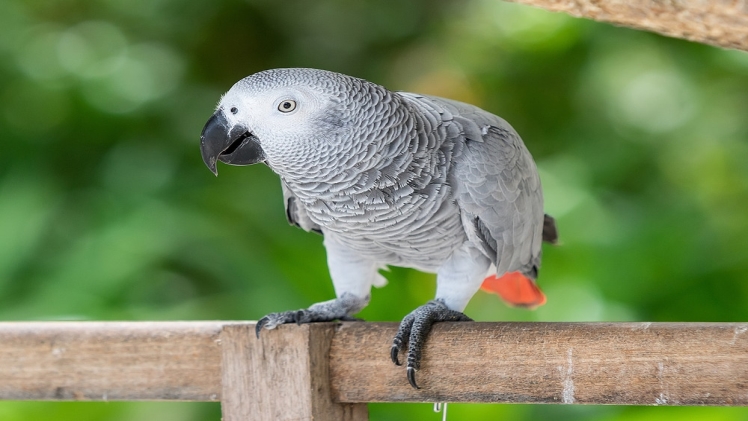Intelligent African grey parrots can develop close relationships with people. While these lovely birds may make wonderful pets in the appropriate household, they require a lot of care, love, and exercise to be healthy and behave properly.
Details Regarding The African Grey Parrot
Weight: 15 to 18 ounces.
Size: 13 inches.
Lifespan: It has an 80-year maximum lifespan.
Physical Features: The body has a variety of grey hues. Its tail feathers are a unique crimson colour. (African Grey Parrots For Sale)
A proper setting allows African grey parrots to articulate phrases that contain more than 1000 words. Its reputation as one of the smartest birds in the world is largely due to these two factors.
These charming and sharp birds associate closely with people and may frequently adjust to their keepers’ emotions.
Care For African Grey Parrots
It would be best if you gave the bird enough opportunity to mingle with humans and other pets, be cognitively challenged and receive plenty of exercise outside of the cage in addition to taking care of the young. They also require hours to develop.
The Hutch
Your African grey requires sufficient space in his cage to expand his wings without hitting the walls. And moving from one island to another is simple.
The materials used to construct parrot cages should be secure, sanitary, long-lasting, and non-toxic. Perches ought to be a variety of sizes, shapes, and textures. Your grey nails may be kept tidy with a concrete perch.
Diet
The African grey’s food in its native habitat (the forest) consists of various vegetables, nuts, and fruits. Even though a diet heavy in grains might seem like the best option, it’s not. However, these baits could be more effective as they let the birds choose the seeds, they like most. Frequently, this results in an imbalanced diet. (Parrots For Sale Near Me)
A parrot’s diet should consist of roughly 75% high-quality food from scraps or treats. These specifically created snacks guard against spoiling and can provide your flightless companions with a filling and healthy diet.
About 20 to 25 per cent of the African grey’s diet consists of dark-green leafy fruits and vegetables. This ought to keep the dosage at or below 5%. Always have access to fresh, clean water for your parrot.
Exercise & Enrichment
African Graces require at least an hour or more of daily interaction with their owner, including activities like games, puzzles, and lessons. Every time you leave the cage, keep your grey in a secure space for your parrot to help build muscles and prevent fat. Maintaining your grey hairs is important since they can lead to issues like consuming foods you shouldn’t. Confront other animals in conflict or leave the area.
Health
One or two annual vet visits are recommended for pet birds to keep them healthy and happy. Certified poultry and exotic animal experts will give you the care that your African Grey requires and merits. And provide the pointers and suggestions required to achieve the ideal white hair. Your African Greyhound will live a long, happy, and healthy life with regular preventative treatment, such as stool testing, blood tests, and immunizations.
Your parrot’s feathers and claws need to be periodically trimmed to keep it feeling and looking its best.
Year-round, appropriate treatment without veterinarian assistance. African greys experience a wide range of negative behaviours and health issues. Feather picking, fear, hostility, hypoglycemia, circovirus (PBFD virus), malnutrition-induced nasal congestion, and peripheral vascular disease are all respiratory illnesses (PDD). (African Grey For Sale)
Cost Of An African Grey Parrot
For everyone, an African grey parrot may not be the ideal pet. If you frequently need to be away from home, go on vacation and spend time with your kids. Or avoid devoting 3 to 5 hours a day to grey hair. If you’re searching for a fuzzy buddy who will be devoted to you and require your love and care, this is not the pet for you. You could find an African grey to be the ideal pet. But remember that since they may live up to 80 years, these birds frequently outlast their owners and require relocation.

